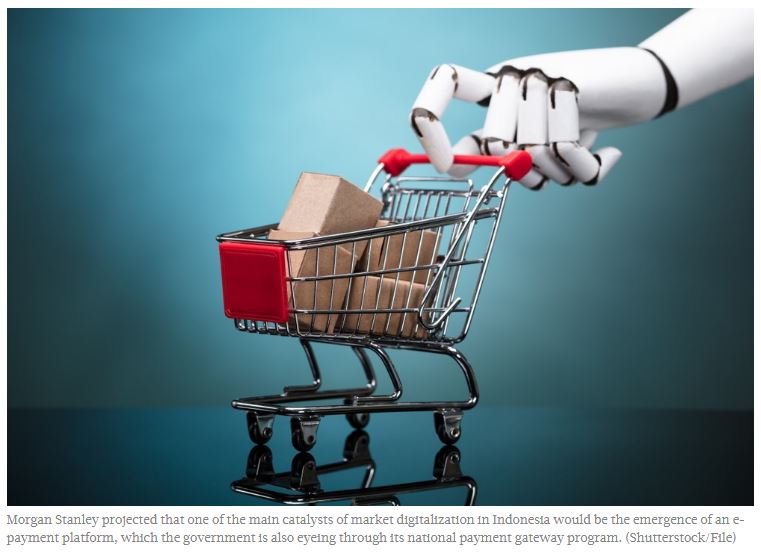Indonesia’s digital disruption will be short-lived: Morgan Stanley
Digitalization will disrupt the Indonesian economy, albeit for a short period of time and before Southeast Asia’s largest economy can enjoy its benefits, according to United States-based investment bank Morgan Stanley.
Sean Gardiner, head of the bank’s ASEAN Equity Research, said on Monday that the market would likely see a disruption in the return on equity (ROE) of conventional companies in the short term.
“All of these [digitalizations] are good news for Indonesia’s equity and economy in the long term, but when it comes to short term, we come back with a view that is a bittersweet situation,” he said during the presentation of a research titled “Indonesia: Digital Disruption” in Jakarta.
“We worried that digitalization will disrupt ROEs in the marketplace for listed companies.”
In the past several years, Indonesia’s oligopolistic environment has boosted the ROEs of listed companies to around 17 percent, one of the highest in the world, according to the research.
However, with increasing competition, especially with recent large capital injections into several local startups, the situation will likely put pressure on conventional players.
The retail industry was one of the first victims of digital disruption, with many retailers last year experiencing a decline in sales, forcing them to close some of their outlets. PT Mitra Adiperkasa (MAP), one of the country’s biggest department store chains, for example, closed all its Lotus department stores and Debenhams outlets in 2017.
A survey from data analysis firm Nielsen Indonesia released in September 2017 showed that the sales growth of 55 fast-moving consumer goods retail outlets had reached only 2.7 percent year-to-date (ytd), compared to a 10-11 percent increase in the same period the year before.
Gardiner said the disruption to ROEs would continue at least in the next three years, “because it takes time to fully materialize [digitalization]”.
Conventional banks have also been disrupted by the digitalization of financial services. Financial technology firms, or fintechs, have been encroaching on lenders’ territories, including payment and lending services.
Morgan Stanley’s research concluded that the coming of fintechs is set to disrupt banks’ dominance over the financial industry.
Fintechs have already taken the lead in payments and alternative lending.
“The deposit of customers’ money in fintech is at zero costs. They can leverage this to bargain for interest income from banks,” Gardiner said.
Mulya Chandra, executive director of Morgan Stanley Indonesia, said the competition between fintechs and conventional banks could benefit Indonesia.
“Fintechs will target SMEs [small and medium enterprises] and banks will take the big players,” Mulya said. “However, I suggest that banks keep upgrading and innovating, as fintechs have overlapped their products.”
Ten years from now, fintechs are set to address the 44 percent of Indonesia’s unbanked population, while e-commerce sales will comprise 19 percent of retail activities in the same period, the research stated.
Mulya also predicted that 24 percent of payment transactions would be done via fintechs, from just 2 percent in 2017.
“People will eventually put a lot of money in their payment application to avoid repetitive deposits. Hence, the situation will benefit fintechs, as they have money floating in banks that will eventually generate interest income,” he added.
Morgan Stanley projected that one of the main catalysts of market digitalization in Indonesia would be the emergence of an e-payment platform, which the government is also eyeing through its national payment gateway program.
Another catalyst is e-connectivity or data monetization, which is driven by smartphone penetration. Ten years from now, smartphone penetration is expected to reach 29 percent of Indonesia’s population, from the current 9 percent, due to the adoption of fiber-based internet.
“There’s still plenty of room for e-commerce growth […], the penetration of which we predict will reach 19 percent by 2027,” the research stated.
Source: http://www.thejakartapost.com/news/2018/05/08/indonesias-digital-disruption-will-be-short-lived-morgan-stanley.html


 English
English




